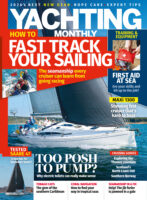What does boat insurance cover and why do boat owners need it? Mike Taylor reveals what lies behind this outlay
What does boat insurance cover and why do boat owners need it?
First, let’s be clear, unlike vehicle cover in the UK, insurance is not a maritime necessity, writes Mike Taylor.
It becomes mandatory when entering most ports, harbours, marinas, yacht clubs and so on, and is a legal requirement in most other countries.
Third-party cover will at least cover you when you cause injury or damage to someone else or their vessel. It’s a case of better to be safe and covered.
When looking for the best boat insurance deal, it is advisable not to apply online – it’s much better to speak directly to a specialist.
Also, check that the company is UK-based, with authorisation from the Financial Conduct Authority.
So what does boat insurance cover?

Proof that you have maintained your boat will help if you ever have to make a claim
Insurance provides protection for the boat as a future investment and also provides cover when a third party (say a crew member) sues you for injury or damage.
However, boat insurance does not cover for third-party claims if your boat is involved in an accident while being trailered on the road.
This should be discussed and arranged through your vehicle insurer.
Shopping around for marine insurance has two critical criteria; best value for money and the right cover for your needs, whether it is boating on inland waterways, coastal cruising, offshore sailing, long-distance passages or using your boat in a competition.
As Simon Winter of Simon Winter Marine Limited explains: ‘When being asked to consider a new policy it is essential that we gain a clear understanding of the boat’s condition. In most cases, this is achieved by requesting that a full yacht survey be undertaken by a specialist knowledgeable in the make and type of boat to be insured. Also, it’s important that we build up a thorough picture of the owners’ experience of owning and maintaining the craft that is under consideration.’

What does your boat insurance cover? Make sure you are clear about what is and isn’t covered by your policy
With the introduction of GRP, yacht production volumes have expanded considerably with improved build quality.
Nevertheless, regular attention and maintenance is still necessary and insurance companies need to be satisfied that owners maintain their yachts and keep them in good condition.
‘When a client contacts us to discuss a new policy we require full details to enable us to tailor a policy to meet their requirements and needs,’ reveals Tony Pauffley of Coleman Marine.
‘It’s nice to know if the client has been around boats for some time and has a feel for boat handling and caretaking.’
‘We always encourage boat owners to arrange a survey of their boat in advance of seeking cover,’ says Adam Summersby, Area Director, Lifestyle Niche at Towergate.
Continues below…
The true cost of cruising… and how to afford it
What’s the real price of long-term cruising? Accountants Christine Muir and Keith Hunt reveal their meticulously kept 12-year balance sheet,…
Brexit: As an EU sailor, what do I need to do if cruising to the UK?
Yachting Monthly experts help you unravel what the new regulations post-Brexit mean for UK and EU sailors
Offshore sailing skills: All you need to know
Will Bruton finds out what coastal cruisers should consider before taking their small yacht on an offshore adventure
How to save money on yacht survey costs
Having a yacht survey can be stressful without the right preparation. Ben Sutcliffe-Davies explains how to get the best advice…
‘There are a number of advantages in doing so, as once the survey has been arranged, this places a contractual obligation on the surveyor and the report then becomes the owners’ property and can be used to obtain insurance quotations from many insurance providers, and offers a useful document should the boat be put up for sale.’
Moreover, in cases where the survey reveals the craft has a history of being professionally maintained it gives a strong feeling of confidence to the insurer.
Equally important are the areas which are not covered by insurance such as corrosion caused by erosion and electrochemical corrosion.
Remember, GRP boats left unattended for long periods can deteriorate through the effects of bad weather where, say, prolonged ingress of rain water into the cockpit can damage soft furnishings and timber fit outs.
‘Grasping an understanding of the boat and its owner is all part of the process,’ continues Pauffley. ‘It’s our job to sell the story of a client and their insurance requirements to the underwriters, thereby linking the three components together.’

You will need to inform your insurance company if you pan to sail offshore, and provide details of your crews’ experience. Credit: Tor Johnson
Explains Summersby: ‘Most underwriters have a set of fairly standard questions about the make of boat, age, value, mooring location and so on. For older boats, or craft with unusual or unique features, it’s important the owner informs their insurer of all the facts. If in doubt, tell us!’
Clearly, maintenance is a vital facet of yacht ownership.
‘The owner has a duty of care to keep the boat seaworthy,’ remarks Summersby. ‘This requirement may be implicit in certain types of insurance, or expressly stated in the documentation. Owners should not underestimate the perils of falling behind on maintenance. Most policies may not pay a claim because of failure to maintain the yacht.’
‘Surveys are a key element in the way we manage our business and are normally carried out every six to seven years, triggered by a timeline on the client’s policy renewal process,’ says Pauffley.
‘If the client has kept their log up to date with information on regular work being done this will sit well with the underwriters. Keeping the log up to date is simply good boat-ownership housekeeping.’
Making the insurance company aware of any planned long passage is also essential.
As well as providing details of crew experience, most companies want a passage plan including avoiding areas of high risk.

A full survey will help you get the best insurance cover for your boat. Credit: Dorset Media Service
Generally, the insurance community lists all such areas, which is updated as necessary.
Research can reveal a selection of comprehensive insurance deals such as an all risk policy that provides an enveloping protection for your yacht.
Under the category of wear and tear, cover is provided for loss or damage where only the part which has failed is excluded.
Additionally, a new-for-old type cover for items less than 10 years old has obvious attractions.
Equally, in circumstances where damage has been caused through corrosion or electrolysis, cover will apply with only the failed part excluded, while an especially attractive option is the agreed value deal with a fixed amount being paid in the event of a total loss.
For racing enthusiasts, no matter what the size of yacht or course to be covered, club racing can also be included.
Common claims include fire damage, theft of personal items and collision while moored at anchor.
Cover for emergency assistance and towing can be included as standard for claims of up to £10,000, all of which make especially attractive propositions when considering insurance deals.
Some clubs recommend that owners should have a personal liability declaration signed as part of their insurance certification.
Boat owners who use club berths often have to hold a valid certificate of insurance for their vessels – in the case of the Royal Southern Yacht Club, this must be in the sum of at least £3m.
Many clubs won’t accept liability for loss or damage to members’ craft, equipment or belongings while on the club’s premises or facilities.
Club members must also ensure that they are in possession of sufficient insurance to cover for the loss or damage to other members’ craft, equipment and belongings while on club premises, and for use of the club’s waterside facilities.
Knowing what is and isn’t covered in your yacht insurance is vital for every cruising sailor, especially when the worst happens.
It is best when you are arranging new cover that you apply a degree of logic; identify where the boat is kept, the type of boat you are insuring, and list the important aspects you need to be covered, plus your own experience, and use the information to go shopping. It could reveal some interesting results.
Case study Rupert Smalley: Stressful process

Rupert Smalley’s 28ft Flying Fish was left holed after a collision with another boat
Rupert Smalley and his wife are seasoned sailors and own the Laser 28 Flying Fish of Howards’ Way fame.

Mike Reynolds is a boat and classic car photo journalist, and has contributed to several magazines since he began his career in 1979
They regularly took part in Wednesday-evening races organised by the Hamble River Sailing Club along with other inshore and offshore events.
Their accident occurred when they were on a starboard tack, became aware of the proximity of a larger 40ft Beneteau and immediately took action to avoid collision.
However, the stem of the Beneteau still managed to collide with the Flying Fish, holing her on the port quarter below the waterline. Immediately, water began pouring in.
The Smalleys took action, coming about and heading back to the mouth of the River Hamble. They were rescued by a passing motor boat, stepping off their fast-sinking yacht.
The Maritime and Coastguard Agency was called, along with the Hamble lifeboat.
Then followed a frustrating six months of wrangling with their insurance company about gaining evidence that they were in the right.
This involved researching the services of a marine solicitor with a view to possible legal action.
The insurance claim was eventually resolved and settled allowing the Smalleys to buy the wreck from the insurance company and, with additional expenditure, to rebuild the boat.
Rupert recalls: ‘One feeling which has not diminished is the anxiety we felt following the sinking of our yacht, matched by our sense of stress over dealing with the claim.’
Case study Graham Nixon: Boat race crash claim

If you take part in racing, you will need to ensure you have adequate cover
Graham Nixon is a well known yachtsman in the Solent having been active in IRC racing with the Royal Ocean Racing Club and the Royal Southern Yacht Club.
‘In 2011 I was taking part in a race in the Solent,’ recalls Graham. ’The conditions were sunny and breezy with a light 16-knot wind blowing. I was approaching the windward mark on starboard, when I realised that another yacht, already round the mark, was heading straight for me on port, with their crew preoccupied hoisting their spinnaker. My crew were sitting out on the starboard side with their legs dangling over the edge. They realised the imminent danger and began screaming at the other boat. But instead of taking avoiding action, the helmsman changed course heading straight for us. Immediately the crew scrambled up as their legs were in danger of severe injury while I crash tacked away to avoid injury to my crew.’
In the event Graham’s yacht still sustained severe damage with the stanchions ripped off along the port side as well as the pulpit.
Immediately, Graham gave instructions for the yacht to be de-rigged and she was then motored back to Cowes for repair.
‘The protest committee exonerated us and our insurer, Noble Marine, handled all the negotiations with the other boat’s insurer and paid for all the repairs,’ recalls Graham thankfully.
Enjoyed reading What does boat insurance cover?
A subscription to Yachting Monthly magazine costs around 40% less than the cover price.
Print and digital editions are available through Magazines Direct – where you can also find the latest deals.
YM is packed with information to help you get the most from your time on the water.
-
-
- Take your seamanship to the next level with tips, advice and skills from our experts
- Impartial in-depth reviews of the latest yachts and equipment
- Cruising guides to help you reach those dream destinations
-
Follow us on Facebook, Twitter and Instagram.








